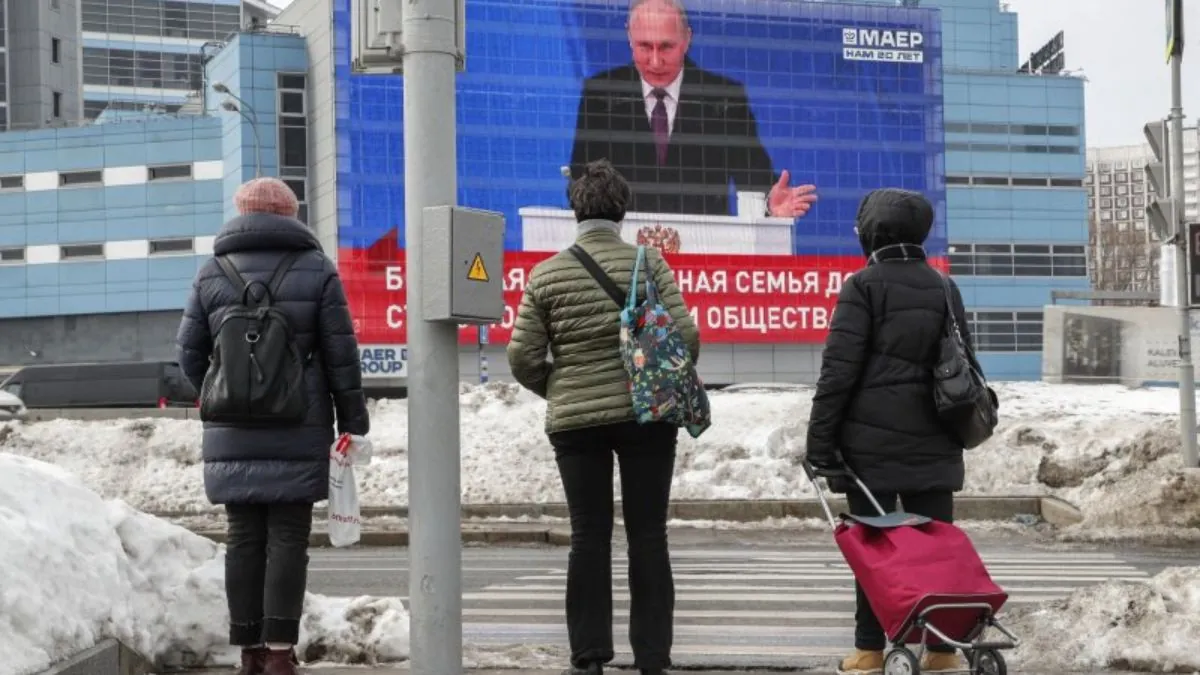This weekend’s Russian presidential election has little drama. We all know Vladimir Putin is going to win. The only serious uncertainty is whether he will get more than 75% of the votes.
It may be easy to interpret these findings as evidence of the Russian system’s strength. Recent Russian army gains in Ukraine appear to reinforce this.
However, my own research, which will be published in a forthcoming book, reveals that the election results and Russia’s military successes in Ukraine conceal a much more troubling reality for the country.
Russia’s political system is not only undemocratic but also violates human rights and is unpredictable. It is also becoming increasingly dysfunctional, stuck in a cycle of bad quality and weak governance that no single person, no matter how powerful, can solve.
Constitutional Dark Arts
The problem derives from Russia’s extreme centralization of power around the president.
This centralization is the result of an increasingly widespread logic that I refer to as the “constitutional dark arts.” This rationale generally suggests that a constitutional system that focuses authority on a single elected leader is better suited to ensuring democracy and protecting rights. This mindset is prevalent in many populist, authoritarian countries, like Hungary and Turkey.
Russia’s 1993 Constitution serves as the cornerstone for this type of government. In order to eradicate communism and enact significant economic reforms, then-President Boris Yeltsin and his supporters—many of whom were from the West—wrote it. As such, it includes a variety of rights and democratic protections, as well as measures that provide an elected Russian president with immense power.
Yeltsin (and his Western backers) characterized this system as democratic since it held the president accountable to the people. They also contended that rights clauses would enable courts to limit abuses by the centralized authority.
These reformers anticipated that Yeltsin would utilize his concentrated authority to promote democracy in Russia. Thirty years later, however, we can see how this application of the “constitutional dark arts” failed tragically.
Since 2000, Putin has used consolidated authority to abolish all balances of power. He has also changed elections, the media, and the courts from sources of accountability to vehicles for projecting a strong presidential image.
The approaching presidential election is only the latest example.
Poor Quality Governance
Although this concentrated structure has allowed Putin to control politics, it promotes weak and ineffective government, particularly outside of Moscow. There are at least two components in play.
First, in Russia, centralized decision-making is frequently based on insufficient or inaccurate information. Russia’s full-fledged invasion of Ukraine in 2022 is one example. It was predicated on intelligence that the operation would be completed quickly and that Ukrainians would likely welcome Russian troops.
Second, centralized directives are delegated to underfunded, incompetent, or weak entities. Russia’s response to the COVID-19 pandemic was devastating, owing in large part to under-resourced regional authorities that were overwhelmed by such a broad-scale crisis.
The opposition leader Alexei Navalny’s political movement has benefited from this dysfunction. Prior to his death last month, Navalny and his team sharply condemned the Russian regime’s corruption and weakness, as well as its inability to rebuild roads, provide healthcare, and adequately compensate teachers and physicians.
This message was effective, and Navalny became the first opposition figure to form a wide alliance throughout Russia’s 11 time zones.
This broad coalition alarmed the Kremlin to the point where Navalny was poisoned in August of 2020. Although it remains to be seen how his political movement will react to his passing, this core critique of the government remains one of its most powerful statements.
Although it is unable to conduct impartial polls on internal matters during the Ukraine crisis, it appears that Putin and his government are concerned about this weakness. Putin addressed these issues obliquely in his address to parliament on February 29, pledging new national programs to rebuild infrastructure, support families, and improve quality of life.
These promises, however, are unlikely to be fulfilled. Putin has previously pledged such measures in the run-up to presidential elections. However, when it comes to putting them into action, Russia’s regional sub-units are frequently underfunded.
With so much money currently flowing to the military, it’s unlikely that the latest round of pledges will be any different.
With Putin ready to begin his fifth presidential term, the concentration and personalization of power will only grow.
Increasing Dysfunction
Externally, this centralization is probably going to lead to an unstable Russia run by a man who makes decisions based on an increasingly paranoid worldview and false or inaccurate facts. Former German Chancellor Angela Merkel previously said that Putin is “living in another world.”
This is likely to lead to more foreign policy adventure and aggression. It is also likely to lead to tougher suppression of any dissenting voices within Russia.
We should also expect Russia to become increasingly dysfunctional, with deteriorating roads, housing, schools, healthcare, and other infrastructure, particularly outside of Moscow.
This also applies to the military, which remains weak despite recent battlefield successes. For example, Russia’s extremely centralized command system has destroyed the officer corps and resulted in staggering equipment losses. Although Russia has managed to muddle through by depending on its massive population and industrial resources, these fundamental issues are having a significant impact on its combat capacity.
Despite rising repression, these issues provide a possibility for a democratic opponent, especially if Putin is eventually replaced by another leader.
Russia’s broken administration serves as a timely lesson for Western media, policymakers, and analysts. While it should not lead to complacency, noting Russia’s bad governance is a crucial tool in countering the Kremlin’s carefully manufactured image of power and authority.

